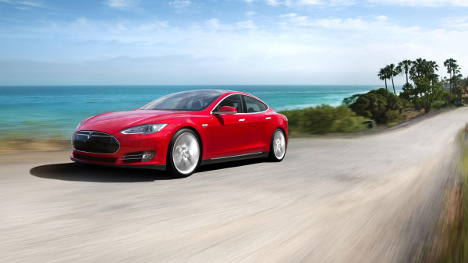Tesla Sales Model May Push No-Haggle Pricing Forward

By subscribing, you agree to receive communications from Auto Remarketing and our partners in accordance with our Privacy Policy. We may share your information with select partners and sponsors who may contact you about their products and services. You may unsubscribe at any time.
COLLEGE PARK, Md. –
If Tesla Motors is successful in pushing its direct-to-consumer sales model forward as well as bringing a more affordable electric vehicle to the market, the company may make an even bigger splash in the dealer market in the near future.
And if Tesla solidifies a larger footprint in the industry, its core business practices, such as no-haggle pricing, have the potential to bleed over into the current franchised dealer model.
Announced Thursday, Tesla is fighting one the latest restrictions put on the company through recent lawsuits stemming from disapproval of the company’s direct-to-consumer sales model.
The luxury electric vehicle automaker is appealing New Jersey’s Motor Vehicle Commission ruling that would ban the carmaker from selling its luxury electric vehicles directly to auto shoppers in the state.
Tesla leadership is appealing of the basis that the regulation contradicts a franchise statute the New Jersey state Legislature approved that green lights such a sales model.
“Franchise dealers have an inherent conflict of interest in selling electric vehicles,” Tesla said in the filing. “In order to do so effectively, they would need to enthusiastically tout the reasons why electric vehicles are superior to gasoline vehicles. This is not something that they are going to do since gasoline vehicles represent virtually all of their revenue.”
Subscribe to Auto Remarketing to stay informed and stay ahead.
By subscribing, you agree to receive communications from Auto Remarketing and our partners in accordance with our Privacy Policy. We may share your information with select partners and sponsors who may contact you about their products and services. You may unsubscribe at any time.
If overturned, New Jersey would join New York in allowing Tesla to sell directly to consumers, bypassing the current franchised dealer system.
And with Tesla Motors claiming to have a more affordable vehicle in the works (see more on the Tesla “Gen III” here), it’s becoming more and more likely Tesla Motors is here to stay — along with its controversial direct-to-consumer sales model.
David Kirsch and Brent Goldfarb, both associate professors of management and entrepreneurship at the University of Maryland's Robert H. Smith School of Business, suggest that dealers can and should consider responding to the Tesla challenge through a different route than filing more lawsuits.
Kirsch, author of the revised dissertation The Electric Vehicle and the Burden of History, published by Rutgers University Press in 2000, says dealers should first consider “why Tesla is different.”
Kirsch and Goldfarb outlined a few factors of Tesla’s business model that sets it apart from traditional dealerships, as follows:
- Tesla does not want a dealer intermediary so as to control the relationship with the consumer.
- Compensation for Tesla employees is not tied to closing deals.
- Second, at present, with Tesla's small vehicle lineup, it does not need large showrooms, which allows the company to put stores in high-traffic areas.
- Tesla does not care who makes the sale so there is no competition between stores.
All of these factors lead to an overall different car-buying experience, and the two professors pointed out “the way dealerships are structured makes replicating these components difficult.”
That said, if the Tesla model grows and becomes more competitive, and if car shoppers begin to expect a similar experience from traditional dealerships, the franchised dealer network may have shift its processes.
Kirsch explained that one of the changes that might occur for franchised dealers to remain competitive with such a model is the adoption of no-haggle pricing.
Many dealer groups, such as CarMax, have already adopted this model and taken negotiating out of the sales process.
Kirsch also noted dealers will have to provide significant post-sale service to customers to keep up with Tesla’s ex-post service plans. Their vehicles also include more intuitive systems that cut down on service visits. For example, the Internet-connected Tesla Model S is designed to self-diagnose issues and can download software fixes and updates without help.
Most franchised dealerships are driven by competition — interestingly, on the other hand, there is no competition between Tesla stores or Tesla employees, as compensation is not tied to closing deals.
“To replicate this sales experience, one would have to remove incentives to undersell, as currently there is competition between dealerships selling the same car,” said Goldfarb.
Goldfarb explained that one response from the franchised dealer body would be to merge dealerships in each geographic market.
“This would allow unifying the sales experience,” he said.
He also noted that no-haggle prices would allow removal of commissions as a compensation mechanism, “and economies of scale might allow a better customer relationship.”
The bottom line?
If Tesla is successful in pushing their direct-to-consumer sales model and bringing an affordable vehicle to the market, shifts and changes in the franchised dealer network may follow.
Kirsch contends focusing on a smoother sales process instead of lawsuits might make people buy more cars, as well as continue the progress of the fast-paced, ever-changing world of car sales.
More information regarding the University of Maryland's Robert H. Smith School of Business can be found here.


